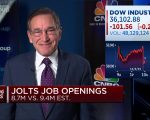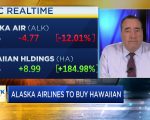
Walmart on Thursday topped Wall Street’s fiscal third-quarter earnings estimates as sales rose, but the big-box retailer struck a cautious tone with its outlook after it saw consumer spending weaken at the end of the period.
The company’s shares slid more than 7% in morning trading Thursday after they touched an all-time high the previous day. Walmart gave a slightly lower-than-expected forecast for the year as it enters the critical holiday shopping season.
The company anticipates adjusted earnings per share of $6.40 to $6.48 for the year, lower than the $6.48 analysts expect but higher than its previous range. Walmart expects consolidated net sales will rise 5% to 5.5%, also an increase from its prior range.
Inflation has also waned — and for some categories, deflation has taken hold — a trend that could help Walmart’s shoppers but hurt the company’s sales. Prices of some grocery items remain higher, but they have fallen for dairy, eggs, chicken and seafood, CEO Doug McMillon said on the company’s earnings call. He added that relief is coming for customers as they look for holiday gifts.
General merchandise prices have continued to fall, setting up the company for a turnabout. Its sales have risen in part because shoppers have had to pay higher prices for many items during a period of inflation.
“In the U.S., we may be managing through a period of deflation in the months to come and while that would put more unit pressure on us, we welcome it, because it’s better for our customers,” he said.
In a separate interview with CNBC, Chief Financial Officer John David Rainey said consumers are “leaning heavily” into major promotions as they watch their spending and search for deals. As customers hold out for lower prices, the company has seen a drop in purchases before and after a sales event.
“Our events have been strong,” he said. “We’ve been pleased with those. Halloween was good overall. But in the last couple of weeks of October, there were certainly some trends in the business that made us pause and kind of rethink the health of the consumer.”
At the start of the holiday quarter, however, he said sales of items including clothing picked up as holiday promotions gained momentum.
Here’s what Walmart reported for the three-month period ended Oct. 31 compared with what analysts were expecting, according to consensus estimates from LSEG, formerly known as Refinitiv:
- Earnings per share: $1.53 adjusted vs. $1.52 expected
- Revenue: $160.80 billion vs. $159.72 billion expected
In the fiscal third quarter, Walmart’s net income rose to $453 million, or 17 cents per share, compared with a loss of $1.8 billion, or 66 cents per share, in the year ago period. Walmart posted a loss in that quarter due to a settlement of opioid-related legal charges.
Revenue rose from $152.81 billion in the year-ago period. It climbed on the strength of the retailer’s grocery business, which has thrived during a period of high inflation, and digital sales.
Comparable sales for Walmart U.S. rose 4.9% and at Sam’s Club, comparable sales rose 3.8% year over year.
In the U.S., shoppers both visited and spent more. Customer transactions rose 3.4% and the average ticket grew 1.5%. E-commerce sales increased 24% in the U.S. and 15% across the globe year over year.
Walmart is also making money in newer ways, such as selling ads and annual memberships to Walmart+, its answer to Amazon Prime.
Revenue for its ad business, Walmart Connect, jumped 26% from the prior-year period.
As the holidays approach, investors have bet the big-box retailer has the ingredients to drive sales, even as shoppers are more discerning. It’s the nation’s largest grocer, which helps drum up steadier foot traffic.
Shares of the company touched an all-time high Wednesday dating to when Walmart debuted on the New York Stock Exchange in August 1972. The stock closed at nearly $170 on Wednesday, up about 19% for the year.







